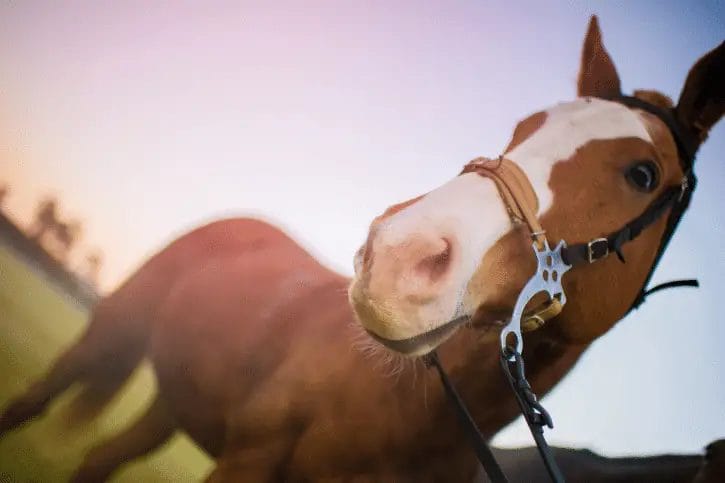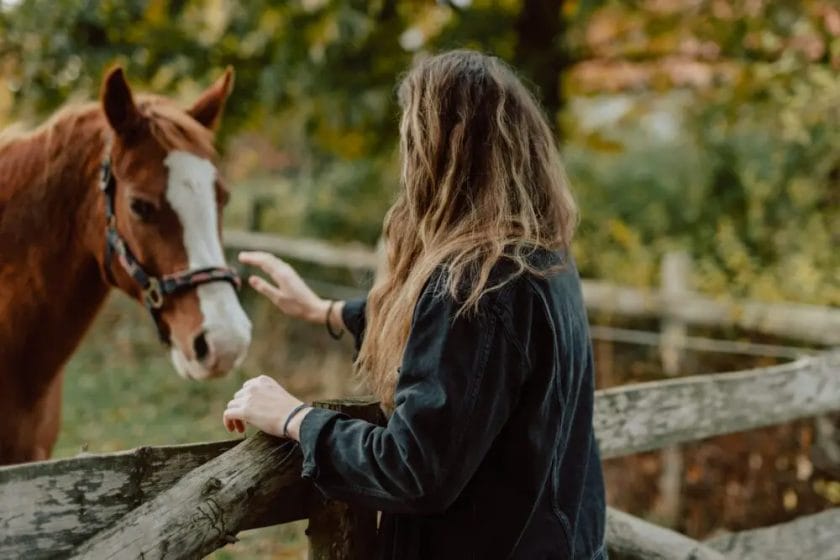Horses are remarkably intuitive animals with highly developed senses. While there is no scientific evidence to suggest that they can sense “evil” in the supernatural sense, they are incredibly perceptive to their surroundings and the emotions of those around them.
Horses have the ability to pick up on subtle cues and body language, allowing them to sense fear or anxiety in humans. Their keen observational skills and heightened sensitivity make them excellent judges of human character.
Many horse owners and trainers believe that horses can sense negative energy or emotions, reacting differently in the presence of individuals who are tense, aggressive, or fearful.
This keen sensitivity and ability to detect subtle cues allow horses to establish a bond of trust and understanding with their human counterparts, making them exceptional therapy animals and companions.
While horses might not possess an inexplicable ability to detect “evil,” their innate perceptiveness makes them exceptional beings capable of attuning to the emotions and energies of those around them.

The Intuitive Nature of Horses: Can They Detect Evil?
Horses are known for their incredible intuition and ability to sense things that humans often overlook. Whether it’s their keen sense of danger or their ability to understand human emotions, horses have captivated our imaginations for centuries. But can they go a step further and detect evil? Let’s explore the intuitive nature of horses and the fascinating question of whether they can truly sense evil.
Horses have been domesticated for thousands of years and have developed a unique bond with humans. Their natural instincts and heightened senses make them exceptional at reading non-verbal cues. They can pick up on subtle changes in body language, tone of voice, and even energy levels. This ability to perceive and interpret these cues allows them to form deep connections with their human counterparts.
Many horse owners and trainers believe that horses have the remarkable ability to detect and react to negative energy or evil intentions. They claim that horses can sense when someone has ill intentions or when a dangerous situation is about to unfold. This belief is rooted in the horse’s acute awareness of their surroundings and their instinct to protect themselves and their herd.
Research suggests that horses can indeed pick up on human emotions and intentions. A study conducted by researchers at the University of Sussex found that horses are highly skilled at recognizing human facial expressions. They can differentiate between happy and angry faces, indicating their ability to interpret human emotions. This study suggests that horses are not only in tune with their own emotions but also with those of the people around them.
Furthermore, horses have demonstrated their ability to sense danger and react accordingly. They have been known to exhibit signs of distress or unease when faced with potentially harmful situations. This heightened sensitivity to danger is believed to be a result of their ancestors’ survival instincts in the wild. Horses have evolved to be hyper-aware of their environment and are quick to react to any potential threats.
While there is no scientific evidence to prove that horses can detect evil specifically, their intuitive nature and keen senses make it plausible. It is possible that horses, with their heightened ability to sense danger and read emotions, may be able to detect negative energy or ill intentions in certain individuals. However, it is important to note that this belief remains largely anecdotal and subjective.
In summary, horses possess an incredible intuition and a heightened ability to read non-verbal cues, including human emotions and intentions. While there is no concrete scientific evidence to support the notion that horses can detect evil, their intuitive nature and sensitivity to danger make it a plausible theory. The bond between humans and horses is a testament to the remarkable abilities of these majestic creatures.

Equine Perceptions: Exploring the Sense of Danger in Horses
When it comes to understanding the behavior of horses, it is essential to delve into their unique sensory perceptions. One fascinating aspect of equine perception is their ability to sense danger. Horses have evolved to be acutely aware of their surroundings and can detect potential threats with remarkable accuracy. In this section, we will explore how horses perceive danger and the mechanisms behind their heightened sense of awareness.
Horse Vision
Understanding how horses perceive danger starts with examining their vision. Horses have eyes positioned on the sides of their head, allowing them to have a wide field of vision covering approximately 350 degrees. While this panoramic vision is beneficial for detecting movement, it comes at the cost of reduced depth perception. Horses rely primarily on monocular vision, meaning they use each eye independently to gather information about their surroundings.
Horses have a higher number of rod cells in their retinas, which are responsible for detecting movement and dim light. This adaptation allows them to spot potential dangers even in low-light conditions. However, their color vision is limited compared to humans, and they primarily see in shades of blue and green.
Heightened Hearing
In addition to their visual acuity, horses possess an exceptional sense of hearing. Their large, mobile ears can rotate and swivel to pick up sounds from any direction. Horses can tune their ears to different frequencies and have an uncanny ability to detect even the faintest of noises.
This acute hearing allows horses to detect predators or other potential threats long before they are visible. They can recognize the sound of specific predators, such as the rustling of leaves or the footsteps of a predator approaching. This heightened auditory perception plays a crucial role in their ability to assess danger and take appropriate evasive action.
Sensitive Sense of Smell
Another aspect of equine perception that aids in their assessment of danger is their sense of smell. Horses have a highly developed olfactory system, with more than 300 olfactory receptors in their nasal cavity. This enables them to detect a wide range of scents and distinguish between various odors.
Horses can identify familiar scents, such as the smell of their handlers or stablemates, and can also detect the presence of predators or other animals in their environment. They rely on their sense of smell to assess the freshness of food, the health status of other horses, and to sense potential sources of danger.
Intuition and Herd Dynamics
While horses possess keen sensory perceptions, their ability to sense danger goes beyond their individual senses. Horses are highly social animals and rely on the dynamics of their herd to assess potential threats. They have a remarkable ability to pick up on subtle cues from other horses, such as changes in body language or vocalizations.
Through their intuition and herd dynamics, horses can detect danger through the collective awareness of the group. This allows them to coordinate their responses and take appropriate action swiftly. Their heightened sense of danger is not only based on their individual perceptions but also on the collective wisdom of the herd.
In Summary
Horses possess a remarkable ability to sense danger through their keen sensory perceptions. Their wide field of vision, acute hearing, sensitive sense of smell, and intuitive understanding of herd dynamics contribute to their heightened awareness of potential threats. By tapping into their unique sensory abilities, horse owners and handlers can better understand and respond to their horses’ needs, ensuring their safety and well-being.

The Power of Horse Intuition: Unveiling Their Sixth Sense
Have you ever wondered about the mysterious connection between a horse and its rider? How they seem to communicate effortlessly, almost as if they share a sixth sense? This phenomenon is known as horse intuition, a remarkable ability that horses possess and utilize in their interactions with humans. In this section, we will delve into the power of horse intuition and explore how it contributes to the unique bond between horses and humans.
Understanding Horse Intuition
Horse intuition refers to a horse’s innate ability to sense and interpret subtle cues from its environment and those around it. This heightened sense of perception allows them to pick up on human emotions, intentions, and even physical sensations. It goes beyond basic obedience training and enables horses to respond intuitively to their rider’s needs. This sixth sense is deeply ingrained in their nature and has evolved over centuries of domestication.
The Science Behind Horse Intuition
While the exact mechanisms behind horse intuition are not fully understood, scientific research suggests that it may be attributed to a combination of factors. One of these factors is their highly developed sensory systems. Horses have keen senses of sight, hearing, and smell, allowing them to perceive subtle changes in their environment.
Additionally, horses possess an extraordinary ability to read human body language. They can detect minute shifts in posture, facial expressions, and vocal cues. This heightened sensitivity to human nonverbal communication enables them to pick up on subtle cues that may go unnoticed by others.
The Role of Trust and Bonding
Trust and bonding play a crucial role in the development of horse intuition. Horses are social animals by nature and form strong emotional connections with their human counterparts. When a rider establishes a relationship built on trust and mutual respect, it enhances the horse’s ability to perceive and respond to their cues.
Building this trust involves consistent training, positive reinforcement, and empathetic communication. The more time and effort a rider invests in understanding and connecting with their horse, the stronger their intuitive bond becomes.
The Practical Applications of Horse Intuition
Horse intuition has a myriad of practical applications in various equestrian disciplines. Let’s explore some of the ways in which this sixth sense is harnessed:
Therapeutic Riding
Therapeutic riding programs often utilize the power of horse intuition to help individuals with physical, cognitive, or emotional disabilities. Horses can sense the needs of their riders, providing them with comfort, support, and a sense of freedom. This intuitive connection has shown remarkable therapeutic benefits, promoting physical and emotional healing.
Equine-Assisted Therapy
Equine-assisted therapy incorporates horse intuition to assist individuals in achieving specific therapeutic goals. Horses can mirror human emotions and behaviors, offering valuable insights into the client’s emotional state and promoting self-awareness and personal growth.
Performance and Competition
In the world of competitive horse riding, horse intuition plays a significant role in achieving success. A skilled rider who can effectively tap into their horse’s intuitive abilities gains a competitive edge. By understanding and responding to the horse’s subtle cues, riders can enhance their performance and synchronize their movements with their equine partner.
Enhancing the Horse-Human Connection
The power of horse intuition highlights the profound connection between horses and humans. To tap into this extraordinary sixth sense, riders must cultivate empathy, patience, and understanding. By developing a deep level of trust and communication, riders can unlock the full potential of their equine partners.
In summary, horse intuition is a remarkable phenomenon that allows horses to sense and respond to their riders’ needs on a deeper level. This sixth sense is rooted in their highly developed sensory systems, coupled with their ability to interpret human body language. By nurturing trust and bonding, riders can harness the power of horse intuition for therapeutic purposes, as well as in competitive equestrian pursuits. The power of horse intuition truly unveils the special and unique relationship between horses and humans.
Understanding Horses’ Instincts: Detecting Negative Energy
Horses are not only majestic creatures but also highly sensitive animals. They possess a unique ability to detect and respond to the energy around them, including negative energy. In this section, we will explore how horses’ instincts help them sense and react to negative energy.
1. Body Language:
One of the primary ways horses detect negative energy is through their keen observation of body language. They are experts at reading subtle cues and signals from humans and animals alike. Horses can pick up on tension, stress, fear, and aggression through body language, such as facial expressions, posture, and movements. They are highly attuned to our emotional states, making them excellent judges of negative energy.
2. Sensing Fear:
Horses are particularly adept at sensing fear in humans. Fear emits strong negative energy that horses can readily detect. They can pick up on the slightest increase in heart rate, changes in body temperature, and the release of stress hormones. When a person experiences fear or anxiety, a horse’s heightened senses allow them to respond accordingly, either by becoming more alert or displaying signs of discomfort.
3. Intuition:
Horses possess a remarkable intuition that enables them to sense and react to negative energy even when there are no apparent physical cues. They have a sixth sense, often referred to as their “gut feeling” or “horse sense,” that helps them detect danger or negative intentions. This intuition is believed to be a result of their evolution as prey animals, allowing them to survive in the wild by avoiding potential threats.
4. Mirror Effect:
An interesting aspect of horses’ ability to detect negative energy is their tendency to mirror the emotions and energy of those around them. When a person exhibits negative energy, such as anger or frustration, a horse may respond by becoming agitated or anxious. On the other hand, if someone approaches a horse with a calm and positive energy, the horse is more likely to exhibit relaxed behavior. This mirror effect highlights the direct influence our energy has on horses.
5. Sensitivity to Environmental Factors:
Horses are highly sensitive to their environment and can detect negative energy not only from humans but also from their surroundings. They can perceive changes in weather, atmosphere, and the energy of other animals in their vicinity. Horses may display signs of unease or restlessness in response to negative energy present in their environment, making them excellent barometers of unseen disturbances.
In summary, horses possess a remarkable ability to detect negative energy through their heightened senses and intuition. Their observation of body language, sensitivity to fear, and the mirror effect all contribute to their remarkable skill in sensing negative energy. Understanding and respecting a horse’s instincts can greatly enhance our communication and interaction with these magnificent creatures.
FAQs
Can horses sense evil?
Horses have highly developed senses and can often sense when something is wrong or when they feel threatened. However, the concept of “evil” is subjective and horses do not possess a supernatural ability to detect it.
What is the average lifespan of a horse?
The average lifespan of a horse is around 25 to 30 years. However, with proper care and management, some horses can live into their late 30s or even 40s.
How fast can a horse run?
The top speed of a horse can vary depending on the breed and individual fitness, but an average horse can run at speeds of 25 to 30 miles per hour (40 to 48 kilometers per hour). However, some breeds, like the Thoroughbred, can reach speeds of over 40 miles per hour (64 kilometers per hour) over short distances.
Conclusion
In conclusion, while there is no concrete scientific evidence to suggest that horses can sense evil, anecdotal accounts and experiences of horse owners and trainers suggest that horses possess an extraordinary ability to perceive and react to their surroundings. Their acute senses, including their remarkable ability to read human emotions, make them highly attuned to the energy and intentions of those around them. Whether it is detecting fear, anxiety, or ill intent, horses can often pick up on subtle cues and act accordingly. However, it is important to approach these claims with caution and rely on scientific research to draw definitive conclusions about horses’ ability to sense evil.
